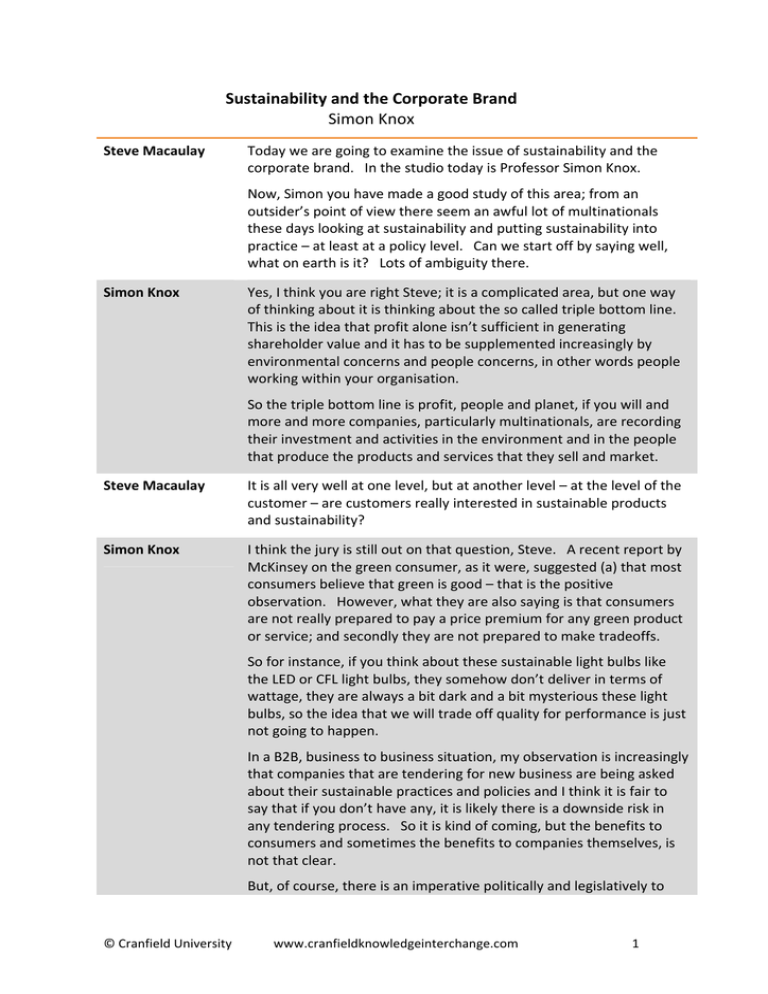Sustainability and the Corporate Brand Simon Knox
advertisement

Sustainability and the Corporate Brand Simon Knox Steve Macaulay Today we are going to examine the issue of sustainability and the corporate brand. In the studio today is Professor Simon Knox. Now, Simon you have made a good study of this area; from an outsider’s point of view there seem an awful lot of multinationals these days looking at sustainability and putting sustainability into practice – at least at a policy level. Can we start off by saying well, what on earth is it? Lots of ambiguity there. Simon Knox Yes, I think you are right Steve; it is a complicated area, but one way of thinking about it is thinking about the so called triple bottom line. This is the idea that profit alone isn’t sufficient in generating shareholder value and it has to be supplemented increasingly by environmental concerns and people concerns, in other words people working within your organisation. So the triple bottom line is profit, people and planet, if you will and more and more companies, particularly multinationals, are recording their investment and activities in the environment and in the people that produce the products and services that they sell and market. Steve Macaulay It is all very well at one level, but at another level – at the level of the customer – are customers really interested in sustainable products and sustainability? Simon Knox I think the jury is still out on that question, Steve. A recent report by McKinsey on the green consumer, as it were, suggested (a) that most consumers believe that green is good – that is the positive observation. However, what they are also saying is that consumers are not really prepared to pay a price premium for any green product or service; and secondly they are not prepared to make tradeoffs. So for instance, if you think about these sustainable light bulbs like the LED or CFL light bulbs, they somehow don’t deliver in terms of wattage, they are always a bit dark and a bit mysterious these light bulbs, so the idea that we will trade off quality for performance is just not going to happen. In a B2B, business to business situation, my observation is increasingly that companies that are tendering for new business are being asked about their sustainable practices and policies and I think it is fair to say that if you don’t have any, it is likely there is a downside risk in any tendering process. So it is kind of coming, but the benefits to consumers and sometimes the benefits to companies themselves, is not that clear. But, of course, there is an imperative politically and legislatively to © Cranfield University www.cranfieldknowledgeinterchange.com 1 Simon Knox reduce carbon dioxide in many countries and I think general managers and business leaders feel a bit of that pressure, but ultimately the CEOs of the major multinationals are just making the decision that it is the right thing to do. So there is a kind of qualitative sense that it is good for reputation; it is good for employees, that is for sure – all the evidence suggests that employees engage in sustainable practices very willingly and very freely and that is highly motivational. So whilst it is maybe difficult to put a cost benefit analysis against much of this activity, it is undeniably the direction that most businesses need to go in. Steve Macaulay Is there anything about reputation here? I am thinking all over the place Marks & Spencer is continually saying what a great job they are doing in this area, and it does seem that consumers will look positively on that. Simon Knox Yes, I think Marks & Spencer have pretty much underplayed their so‐ called Plan A. They are very active across all of their operations and they have very detailed information available for people to look at, but to say it is core to their reputation I think is a bit of an exaggeration. At the moment, it is happening, but they haven’t really linked it closely with their reputation. If you take a company like General Electric though, they have put sustainability absolutely central to their reputation – the so‐called Ecomagination development, which is a huge investment on behalf of General Electric. In fact, they are spending more money on green projects than the US government, and the benefits are there to see. So they are making Ecomagination absolutely central to their reputation – they have even developed some advertisements showing their investment in green products and sustainable practices. So some companies are taking the bold initiative, whereas others are letting it develop and seeing where it goes reputational wise. Steve Macaulay So in summary then, Simon, the jury seems to be out, we seem to be getting some market leaders, but what would you say in summary was the essence of sustainability? Simon Knox I think there is little choice for companies to engage in sustainable practice, whether it is environment, whether it is people issues and employment issues – that is point number one. Point number two is that there seems to be evidence emerging that considerable cost savings can be made. If for instance you take the Tesco sustainable policy, they have set aside £500 million for sustainable investment and 2009 was a year in which they saved a £100 million on sustainable practices. So what we are seeing emerging is some level of cost saving against the upfront © Cranfield University www.cranfieldknowledgeinterchange.com 2 Simon Knox investment, although the model is far from complete. My belief is that over time, it will become a self funding activity, but it takes the brave to make the investment in the first place. Steve Macaulay Simon, thank you very much indeed. Simon Knox A pleasure. © Cranfield University www.cranfieldknowledgeinterchange.com 3


